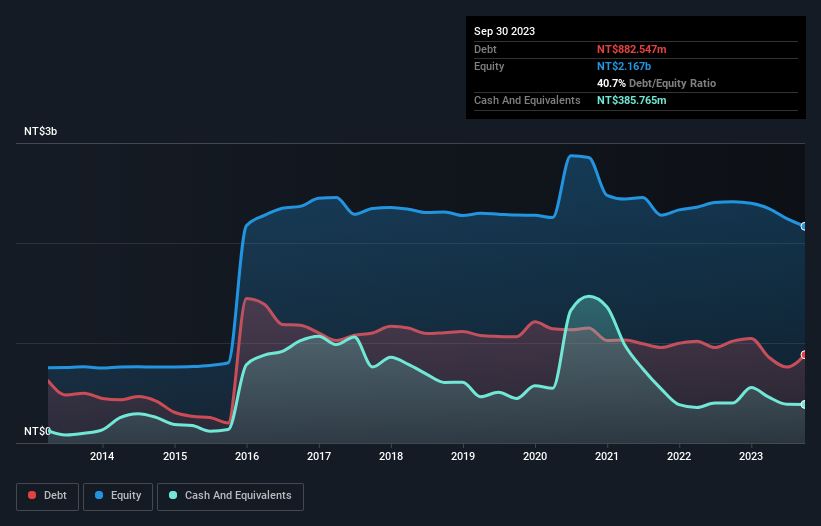Legendary fund manager Li Lu (who Charlie Munger backed) once said, 'The biggest investment risk is not the volatility of prices, but whether you will suffer a permanent loss of capital.' When we think about how risky a company is, we always like to look at its use of debt, since debt overload can lead to ruin. We note that Sunko Ink Co., Ltd. (TWSE:1721) does have debt on its balance sheet. But is this debt a concern to shareholders?
Why Does Debt Bring Risk?
Debt is a tool to help businesses grow, but if a business is incapable of paying off its lenders, then it exists at their mercy. If things get really bad, the lenders can take control of the business. While that is not too common, we often do see indebted companies permanently diluting shareholders because lenders force them to raise capital at a distressed price. Having said that, the most common situation is where a company manages its debt reasonably well - and to its own advantage. The first thing to do when considering how much debt a business uses is to look at its cash and debt together.
See our latest analysis for Sunko Ink
How Much Debt Does Sunko Ink Carry?
The image below, which you can click on for greater detail, shows that Sunko Ink had debt of NT$882.5m at the end of September 2023, a reduction from NT$1.02b over a year. However, it does have NT$385.8m in cash offsetting this, leading to net debt of about NT$496.8m.

How Healthy Is Sunko Ink's Balance Sheet?
According to the last reported balance sheet, Sunko Ink had liabilities of NT$851.3m due within 12 months, and liabilities of NT$691.9m due beyond 12 months. On the other hand, it had cash of NT$385.8m and NT$463.4m worth of receivables due within a year. So it has liabilities totalling NT$694.1m more than its cash and near-term receivables, combined.
Sunko Ink has a market capitalization of NT$3.12b, so it could very likely raise cash to ameliorate its balance sheet, if the need arose. But it's clear that we should definitely closely examine whether it can manage its debt without dilution. There's no doubt that we learn most about debt from the balance sheet. But it is Sunko Ink's earnings that will influence how the balance sheet holds up in the future. So if you're keen to discover more about its earnings, it might be worth checking out this graph of its long term earnings trend.
In the last year Sunko Ink had a loss before interest and tax, and actually shrunk its revenue by 27%, to NT$2.3b. That makes us nervous, to say the least.
Caveat Emptor
Not only did Sunko Ink's revenue slip over the last twelve months, but it also produced negative earnings before interest and tax (EBIT). To be specific the EBIT loss came in at NT$258m. Considering that alongside the liabilities mentioned above does not give us much confidence that company should be using so much debt. Quite frankly we think the balance sheet is far from match-fit, although it could be improved with time. For example, we would not want to see a repeat of last year's loss of NT$236m. In the meantime, we consider the stock very risky. When analysing debt levels, the balance sheet is the obvious place to start. But ultimately, every company can contain risks that exist outside of the balance sheet. We've identified 2 warning signs with Sunko Ink (at least 1 which is potentially serious) , and understanding them should be part of your investment process.
When all is said and done, sometimes its easier to focus on companies that don't even need debt. Readers can access a list of growth stocks with zero net debt 100% free, right now.
New: Manage All Your Stock Portfolios in One Place
We've created the ultimate portfolio companion for stock investors, and it's free.
• Connect an unlimited number of Portfolios and see your total in one currency
• Be alerted to new Warning Signs or Risks via email or mobile
• Track the Fair Value of your stocks
Have feedback on this article? Concerned about the content? Get in touch with us directly. Alternatively, email editorial-team (at) simplywallst.com.
This article by Simply Wall St is general in nature. We provide commentary based on historical data and analyst forecasts only using an unbiased methodology and our articles are not intended to be financial advice. It does not constitute a recommendation to buy or sell any stock, and does not take account of your objectives, or your financial situation. We aim to bring you long-term focused analysis driven by fundamental data. Note that our analysis may not factor in the latest price-sensitive company announcements or qualitative material. Simply Wall St has no position in any stocks mentioned.
About TWSE:1721
Sunko Ink
Engages in the manufacture and trading of chemicals and industrial materials in Taiwan, the United States, Asia, Europe, and internationally.
Mediocre balance sheet and slightly overvalued.
Market Insights
Community Narratives




